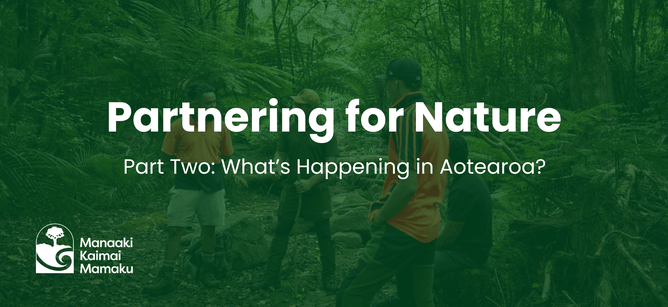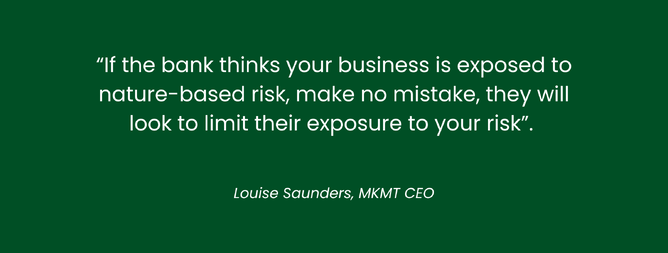In this three part series, we delve into why now is the time for New Zealand businesses to invest in nature.
By Louise Saunders, Manaaki Kaimai Mamaku Trust CEO
Aotearoa is heavily dependent on both nature and international trade for our wellbeing and prosperity.
In part one we looked at how technology has improved global understanding of nature loss, international initiatives and agreements that are driving action, and the development of standardised reporting like the Taskforce on Nature and Carbon-Related Financial Disclosures (TNFD/CRFD).
Here in Aotearoa New Zealand, our economy is both heavily dependent on global trade and the natural environment that supports those exports. For the growth and prosperity of our economy, it’s crucial that we anticipate the risks of trade regulation and actual impacts. As I discussed in part one, our key trading partners are moving towards increased scrutiny of business environmental performance and supply chain resilience.
The Treasury has already recognised this in the Living Standards Framework, which identified that the state of the natural environment is fundamental to the Wealth of Aotearoa. They’ve been working to assess the value of our nation’s natural capital (the capital value that nature contributes to our economy) and include it in national decision making, with limited success to date.
But of course the private sector is always far more agile and responsive for two reasons:
Business owners are directly responsible for identifying and managing material risks and,
The business bottom line will be affected if you don’t.
Chapman Tripp’s 2023 legal opinion found that directors and senior managers have a fiduciary responsibility to understand material risks to the business, which increasingly includes nature-based risk whether through regulation, trade agreements, supply chain requirements or actual impacts on the bottom line.
That means it's time to start incorporating nature into your reporting to the governance team.
Why hasn't the government implemented national standards?
MPs are not at the coal face like business owners are. They operate at an arms-length from the risks and impacts, and they have the luxury of diminishing its importance with labels like “woke” and “virtue signalling”.
An example is the recent "Woke Banking Bill" that aims to ensure bank's lending decisions are based on commercial criteria alone, rather than restricting lending due to environmental concerns. What the bill’s drafters have failed to realise is that environmental risks are material risks with commercial implications if not well managed.
At the select committee hearing, three of our largest banks argued they're one of the same.
Bank sustainability reports analyse entire industry sectors to determine risk profiles for this reason; they’d be irresponsible not to. And since 80% of New Zealand’s exports by value (c. $58 billion) go to markets where ESG (environmental, social, governance) reporting is mandatory or imminent, and 13 of NZ’s top 20 export commodities are moderately to highly dependent on ecosystem services, you can see why this is far from being “woke”.
If a bank thinks your business is exposed to nature-based risk that might impact your profit and the ability to repay debt, the bank has a responsibility to limit their exposure to your risk.
Reducing your risk
There's a variety of ways your business can invest in nature. You could have a simple partnership like volunteering or in-kind support, through to making a detailed analysis of your businesses nature dependencies and investing into target ecosystems to mitigate those risks.
As there's many options, decision-making requires different levels of sophistication and analysis.
There are excellent local resources to help shape your thinking about, and analyse, nature-based risk for your business, and decide what to do about it. Check out the Sustainable Business Network Partnerships guide, Sustainable Business Council Nature guide, and Scaling up investment into nature-related projects.
Your business is built on how people perceive it
The Kaimai Mamaku forests and catchments are estimated to contribute between $568M - $645M per annum to local economies through services like pollination, water supply, regulating climate and erosion control.
By showing the value that natural capital contributes, Bay of Plenty and Waikato businesses can make an investment in ‘scheduled maintenance’ and ‘repairs’ for an otherwise unrecognised asset class that underpins productivity.
But aside from the lofty heights of international trade, directors’ responsibilities and ecosystem services valuations... What about your consumers, staff and stakeholders?
How might nature investment affect your brand, values, messaging and reputation?
Your business is, one way or another, built on how people perceive it. The Kantar Better Futures reports are required reading in this space, and the short story is that stakeholders expect businesses to be part of the nature/climate solution, not part of the problem. Consumers consider sustainability in purchasing choices and believe businesses should do more to reduce impacts. The 2024 report in particular is an excellent guide book to business engagement in sustainability practices and how to communicate authentically and transparently. It talks frankly about the risks of perceived greenwashing and gives excellent guidance on how to communicate well, acknowledging the huge opportunities for your brand when you get it right.
So, as a nation dependent on nature and trade, with strong direction from consumers, and locally appropriate resources to support decision-making, there’s every reason for your business to be a leader in nature investment.




